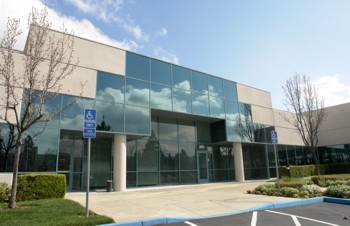Microchip Biotech's Spring Arrival Adds to Park's Biotech Contingent
Microchip Biotech's Spring Arrival Adds to Park's Biotech Contingent
Company Joins Roche Molecular Diagnostics, Waters Corp. in Hacienda
Is there a biotech cluster emerging in Hacienda? Barney Saunders, Ph.D. and Chief Commercial Officer at Microchip Biotechnologies Inc. (MBI), suggests as much, noting the recent arrival of Waters Corp. and Roche Molecular Diagnostics' new research facility. Now Microchip Biotech is following in their footsteps, with refurbishing underway in the 16,000 square feet of space at 5720 Stoneridge Drive the company will occupy later this spring.
Like its fellow Hacienda life-sciences tenants, MBI's specialty is tools for biotechnology research. Where one such company puts down roots, others are apt to follow, Saunders observes. "The more companies in the tools space that establish themselves here, the more attractive it becomes to others. Plus Hacienda is a great location, and we have a very nice-looking facility that will be built out the way we want it," he says.
MBI's focus is on streamlining sample preparation and analysis for the life sciences, through both equipment and sample size. The company's proprietary technology dramatically shrinks the need for large sample volumes to nanoscale size, reduces labor costs through automation, increases reliability, and can provide major savings in the use of highly expensive reagents and scarce samples.
Until now, Saunders explains, the processes for preparing biological samples have tended to be complex and expensive, with researchers having to choose between two less-than-perfect alternatives: error-prone manual procedures or expensive, large robotic systems. MBI's vision is "to create devices - using simple valves, routers, and circuits in glass and plastic - that integrate, automate, and simplify the analysis of biological materials." The cornerstone of this approach is microfluidics, a miniaturized environment where sample quantities are smaller than a water droplet. The company's exclusive microscale on-chip valves (MOVe) technology offers superior sample mixing properties, a major leap forward in automating and integrating sequencing reactions, making the entire process much more efficient.
MBI's first product, the Apollo 100, is specifically designed for Sanger-based DNA sequencing, the standard at the thousands of university DNA-sequencing centers around the country. The company's ultimate goal is to develop complete "sample-to-answer" solutions in a portable footprint, thus allowing all kinds of analysis and measurement to take place outside the lab. "This will lead to the creation of simple-to-use, fully automated, high-performance systems with reduced reagent costs and improved analytic efficiencies using only the tiniest amounts of sample," Saunders explains. Among the potential applications he mentions is the ability to carry out DNA testing at a crime scene. Other examples include testing agricultural crops for pathogens like E. coli O157:H7, which contaminated fresh spinach in 2006, while they are still out in the field; and helping hospitals detect microorganisms that produce problematic infections like methicillin-resistant Staphylococcus aureus.
Incorporated in July 2003, MBI has grown to approximately 40 employees. The new facility will include wet research labs, a small clean room for prototyping, and small-scale manufacturing rooms, "very different from a full-scale fab," Saunders points out. "In classic Silicon Valley mode, we contract out for various pieces, and then do the final assembly and test here."
For more information, visit www.microchipbiotech.com.
Photo: MBI's new Stoneridge Drive facility.
Also in this issue...
- Microchip Biotech's Spring Arrival Adds to Park's Biotech Contingent
- OOBA's Hibiscus Beverage Packs Plenty of Flower Power
- Business Bits
- Executive Profile: Dr. Francine Kitagawa, DDS, Gateway Dental Care
- Grubb & Ellis Management Services: 'Interested, Available and Helpful'
- Barranti Law Group Serves Full Spectrum of Business Needs
- Downtown Pleasanton 'What Everyone Wants to Embrace'
- Hacienda Helping Hands Campaign in Full Swing
- LPFD's 'Together We Prepare' Program Strives for a Disaster-Resilient Community
- Pleasanton Poetry, Prose & Arts Festival Attracts Local Literary Lions
- Hacienda Index
- Calendar





